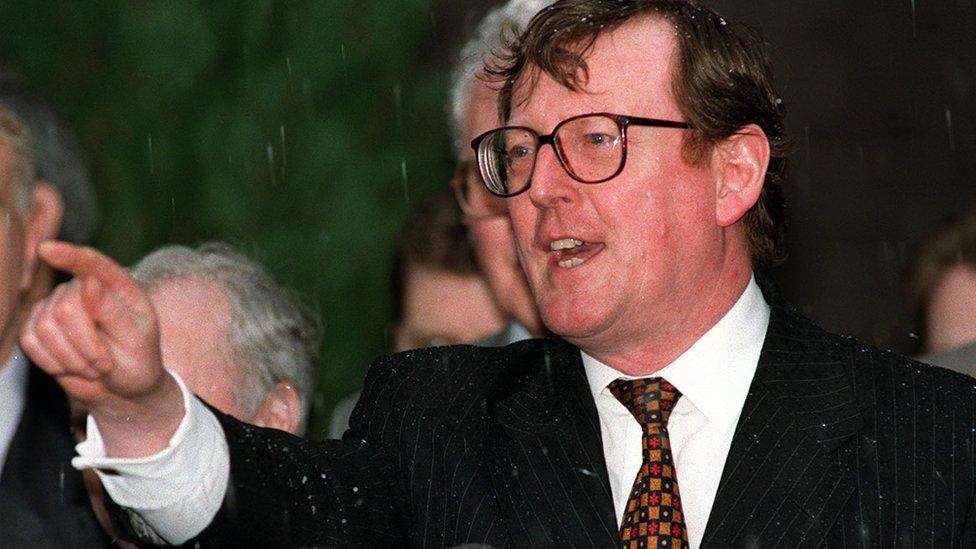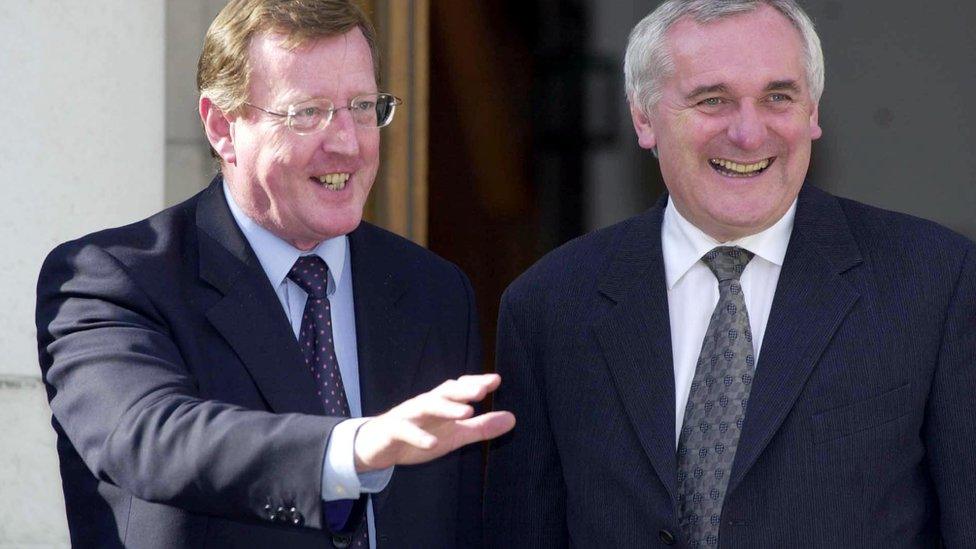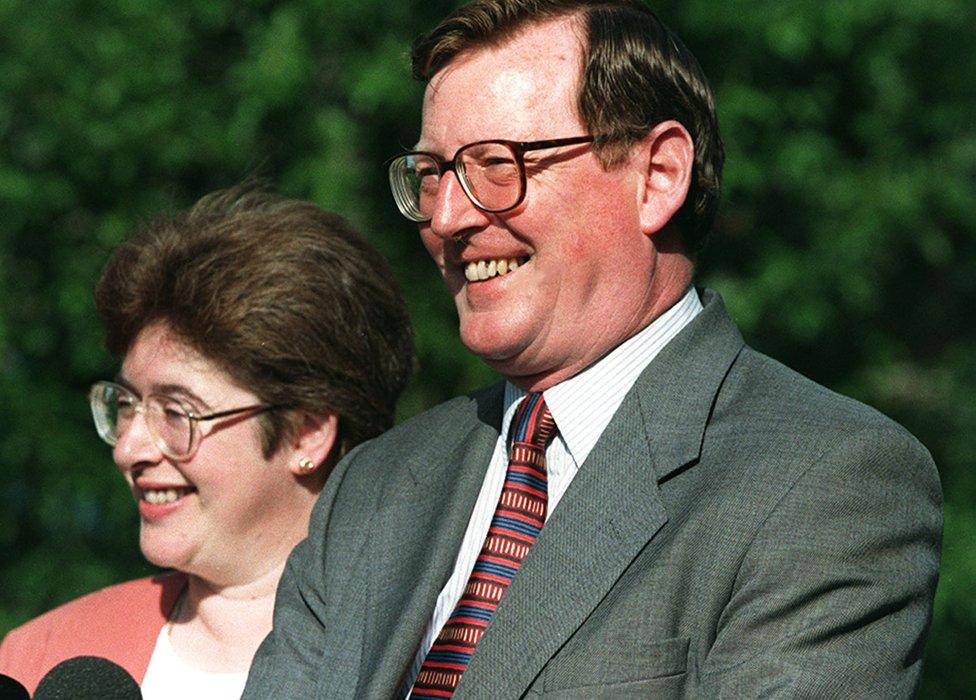David Trimble: Former Northern Ireland first minister and UUP leader dies
- Published

David Trimble was the first person to serve as first minister of Northern Ireland
Lord Trimble, former first minister of Northern Ireland and Ulster Unionist Party leader, has died.
Lord Trimble, who was 77, led the UUP between 1995 and 2005, and was instrumental in the negotiation of the Good Friday Agreement - the peace deal which ended the worst of Northern Ireland's Troubles.
His efforts won him the Nobel Peace Prize along with SDLP leader John Hume.
Since 2006, he sat in the House of Lords as Baron Trimble of Lisnagarvey.
He was the first person to serve in the role of first minister in the new Northern Ireland Executive established as part of the Good Friday Agreement.
A statement from the UUP said: "It is with great sadness that the family of Lord Trimble announce that he passed away peacefully earlier today following a short illness."
He is survived by his wife, Daphne and their four children.
Current UUP leader Doug Beattie described Lord Trimble as a "political giant".
"David Trimble was a man of courage and vision. He chose to grasp the opportunity for peace when it presented itself and sought to end the decades of violence that blighted his beloved Northern Ireland," Mr Beattie said.
"He will forever be associated with the leadership he demonstrated in the negotiations that led up to the 1998 Belfast Agreement.
"The bravery and courage he demonstrated whilst battling his recent illness was typical of the qualities he showed in his political career, at Stormont and at Westminster.

Allow X content?
This article contains content provided by X. We ask for your permission before anything is loaded, as they may be using cookies and other technologies. You may want to read X’s cookie policy, external and privacy policy, external before accepting. To view this content choose ‘accept and continue’.

Prime Minister Boris Johnson described Lord Trimble as "a giant of British and international politics".
"[He] will be long remembered for his intellect, personal bravery and fierce determination to change politics for the better," Mr Johnson added.
Taoiseach (Irish Prime Minister) Micheál Martin said Lord Trimble played "a crucial and courageous role in bringing peace to Northern Ireland".
SDLP leader Colum Eastwood described him as "one of the most consequential political leaders of the last century".
He added that without the former UUP leader's political bravery, the Good Friday Agreement would never have been signed.


Lord Trimble was a hard-line political unionist leader who compromised at a critical time to cement peace in Northern Ireland.
And it came at a great cost, not just a personal cost and the abuse that he received at the time, but also a great cost to his party.
In the years after the Good Friday Agreement, the UUP lost its position as the top unionist party in Northern Ireland to the DUP.
But there's no doubt about it, Lord Trimble got great international acclaim for the steps that he had taken, the bravery that he showed in negotiating a deal that others said was not going to be possible within a unionist leader.
Of course he won the Nobel Peace Prize along with John Hume for his efforts.

David Trimble often found himself facing down political adversaries
And in later years, Lord Trimble became the great defender of the Good Friday Agreement in the House of Lords.
In recent times, he talked about Brexit and of course his concerns about the Northern Ireland Protocol, and how he felt it undermined everything that he had achieved through the Good Friday Agreement.
It was only a few weeks ago that Lord Trimble last made his public appearance at the unveiling of his portrait in Queen's University. On that occasion, he said the portrait was there for others on which to deliver their verdict.
Many people now will be delivering their verdict on Lord Trimble, and his lasting legacy of peace in Northern Ireland.

Sinn Féin vice-president Michelle O'Neill said Lord Trimble's courage in helping negotiate the agreement "leaves a legacy a quarter century on for which he and his family should be rightly proud".
Democratic Unionist Party (DUP) leader Sir Jeffrey Donaldson said the former first minister "made a huge contribution to Northern Ireland, and to political life in the United Kingdom" and was a "committed and passionate unionist who always wanted the best for Northern Ireland".
Sir Jeffrey's disagreements with Lord Trimble over the Good Friday Agreement led to him quitting the UUP in 2003 and defecting to the DUP.
"Whilst our political paths parted within the Ulster Unionist Party, there can be no doubting his bravery and determination in leadership at that time," Sir Jeffrey added.
Lord Trimble's political journey took him from a young hardliner in the 1970s to a unionist leader who compromised to help deliver an executive and assembly at Stormont where unionism and nationalism shared power.
He received much praise, including the Nobel Peace Prize with Mr Hume, for helping to bring to an end to decades of violence in Northern Ireland.
Mr Hume died in August 2020, a few months after Seamus Mallon of the SDLP, who served as deputy first minister when Lord Trimble was first minister.

Bertie Ahern said Lord Trimble was a good negotiator
Former Taoiseach Bertie Ahern, who led the Irish government at the Good Friday Agreement negotiations in 1998, said Lord Trimble was courageous and that although they had "many a row, many arguments", they were able to laugh about that in later years.
"As a good negotiator, when he made a deal, when he settled something, he stuck by it," Mr Ahern told broadcaster RTÉ.
"He stuck by it subsequently and he paid a price, he lost his seat in Upper Bann, he got a lot of criticism from his wider unionist family.
"He was a good guy and he stood firmly by what he believed in and I had a long chat with him just a few weeks ago in Queen's [University] and he knew what was coming, he was brave in that, as he was in everything else."
Gerry Adams, the Sinn Féin leader at the time of the Good Friday Agreement, said that although he and Lord Trimble had fundamentally different opinions, he always believed the UUP leader was committed to the peace process.
'Politics at its very best'
"David's contribution to the Good Friday Agreement and to the quarter century of relative peace that followed cannot be underestimated," Mr Adams said.
Former Prime Minister Tony Blair - who headed the British side at the time of the 1998 peace talks - said Lord Trimble, "in his support of the peace process, showed politics at its very best".
"When some within his own ranks were opposed to the Belfast/Good Friday agreement, he supported it," he said.
"When we needed his willingness to go the extra mile for peace, he travelled that mile. When there was the prospect of collapse of the process without strong leadership, he provided that leadership.
"His contribution to Northern Ireland and to the United Kingdom was immense, unforgettable and frankly irreplaceable."
His predecessor, Sir John Major, said: "When David Trimble became leader of the Ulster Unionist Party, he made a critical contribution to the Northern Ireland peace process.
"He shed his former opposition to the process, and became an innovative advocate for a peaceful settlement.
"This was a brave and principled change of policy, and critical to the creation of peace in Northern Ireland.
"He thoroughly merits an honourable place amongst peacemakers."

U2 frontman Bono endorsed Lord Trimble and John Hume's calls for peace ahead of the 1998 referendum on the Good Friday Agreement
But Lord Trimble came in for sustained criticism from others within political unionism for signing up to the Good Friday Agreement, particularly the DUP.
He was criticised for agreeing a deal which allowed Sinn Féin - the political wing of the IRA - to enter into the devolved government while the IRA had not decommissioned its weapons.
In 2005, he lost his House of Commons seat to a DUP challenger and went on to enter the House of Lords where he sat as a Conservative Party peer.

Lord Trimble is survived by his wife Daphne (left) and their four children
Alliance Party leader Naomi Long said the Good Friday Agreement was Lord Trimble's greatest legacy.
"His contribution to the peace process and the ending of violence in our society helped secure his place in history," she said.
Labour party leader Sir Keir Starmer described him as a "towering figure of Northern Ireland and British politics".
Traditional Unionist Voice (TUV) leader Jim Allister said that while he fundamentally disagreed with Lord Trimble over the Good Friday Agreement, he was a "foremost thinker within unionism".